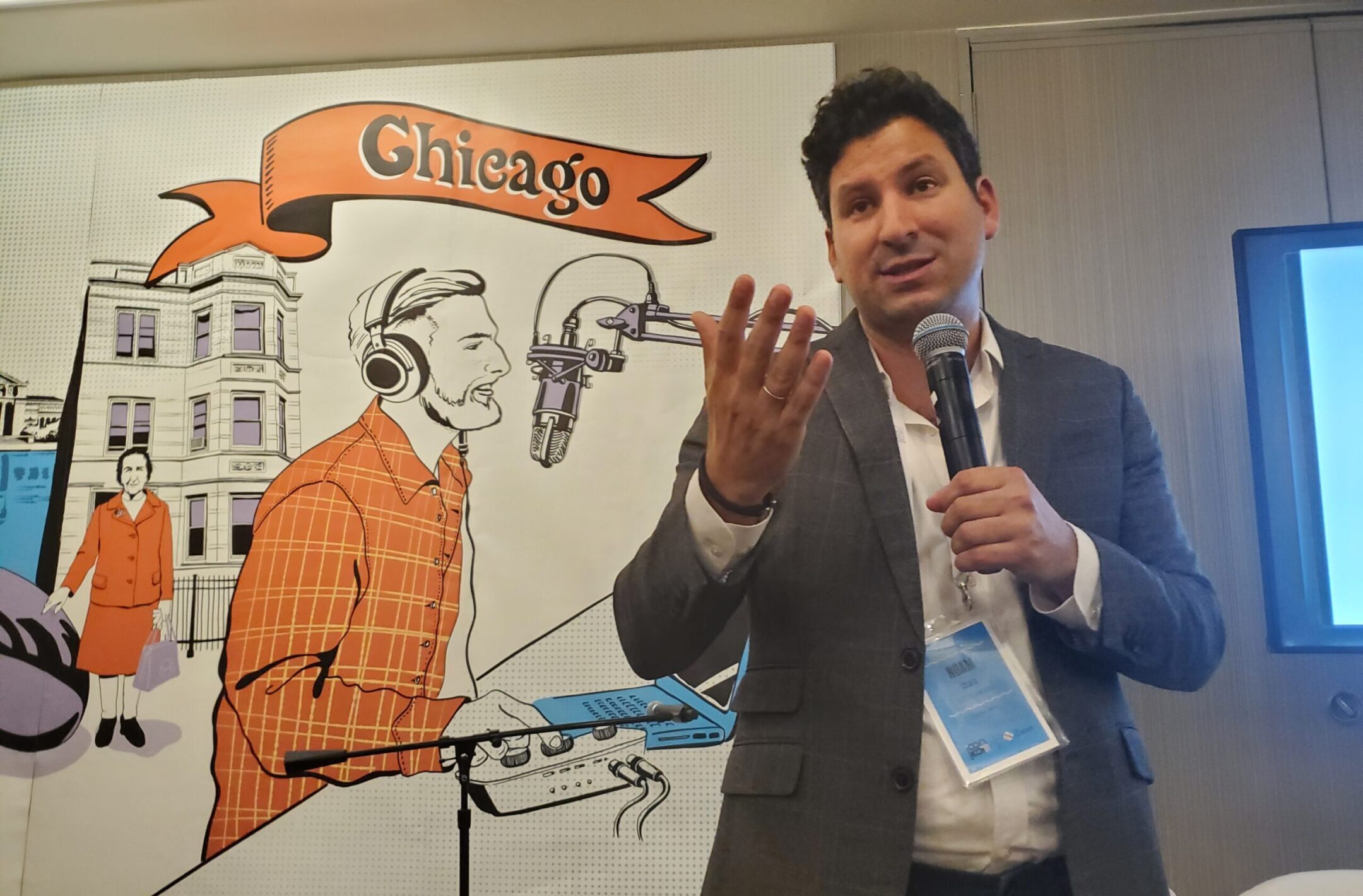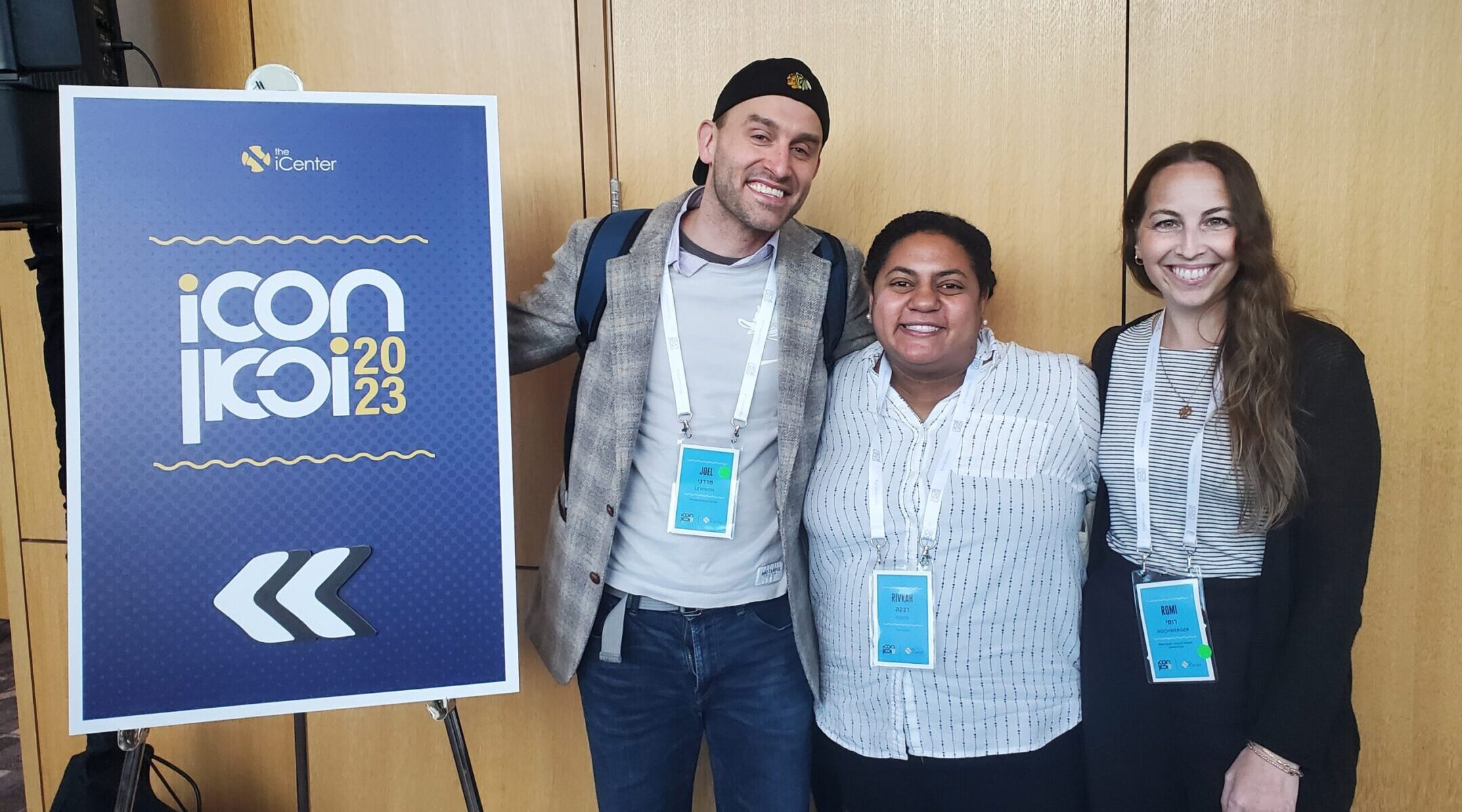CHICAGO (JTA) – At one point ahead of an international conference on Israel education, as raucous anti-government protests filled the streets of Israeli cities, conference organizers considered leaning into the tension created by the news: What if they focused one day of the gathering on conflict, and the next day on hope?
Ultimately, they decided “you can’t divorce the two,” in the words of Aliza Goodman, one of the organizers.
“If you separate them, then it means one is devoid of the other and vice versa,” said Goodman, director of strategy and research and development for the iCenter, the Israel education organization that hosted the conference in Chicago in March.
Israel educators, Goodman said, need to hold “the complexities together with the hopes for us to be able to move forward as human beings.”
That emotional challenge lay at the center of the conference, the iCenter’s fifth, called iCON 2023. The conference covered standard topics in Israel education, ranging from Hebrew literature and language to representations of Jews and Israel in popular culture to a bevy of subtopics related to the Israeli-Palestinian conflict.
But the turmoil that has rocked Israel this year felt no less prominent. In sessions and on the sidelines, the more than 500 participants discussed the Israeli government’s proposed judicial overhaul, its far-right cabinet ministers and the preservation of Israel’s democratic character.
Conference attendees said they faced dual challenges: understanding the political issues at play and reckoning with what they mean for teaching about Israel. Their thoughts on the current historical moment suggested that those challenges would persist even though Israel’s government announced a pause on the judicial overhaul shortly after the conference concluded.
“We are responsible for doing something, don’t get me wrong, but my immediate responsibility is trying to really get a handle on understanding it for myself and for my students,” said Rebecca Good, the assistant director of education at The Temple, a Reform synagogue in Atlanta.
Good has found herself fielding new questions about Israel, mostly from adult congregants, “but we know that the questions and the feelings that are coming from the adults naturally play out in the home,” she said. In response to the perceived need she has recognized from her students, her synagogue planned a town hall-style meeting that took place in late March.
“It’s almost like you do triage, right? When things like this happen, it’s like, ‘OK, how are you?’” Good said. “You have to address that first and then you figure out what is needed and try to make that happen for people.”
Conference attendees included Hebrew school and day school teachers, executives from communal organizations, summer camp professionals, campus activists, young adult Israeli emissaries and more. iCON Program Director Ari Berkowicz estimated that 75% of the conference participants came from North America and 24% from Israel. Others joined from places like Mexico and the United Kingdom.

Educator Noam Weissman addresses the audience at a session of ICON 2023 at the Marriott Marquis in Chicago, Illinois, March 15, 2023. (Rachel Kohn)
“One of The iCenter’s approaches to education is to make all that we teach and all that we learn about both timely and timeless, but the current moment obviously has an impact on who we are as educators and who we are as learners,” said Berkowicz. While the sessions scheduled for iCON 2023 remained mostly unchanged, the facilitators, speakers, and educators were “different people” from what they had been three or six months ago due to the upheaval in Israel, he said.
“They aren’t the same people that they were even yesterday or two days ago,” Goodman added in an interview at the conference. “All of this is impacting them at the core.”
Questions and anguish about the judicial overhaul — and other Israeli government policies – filtered into the conference programming. A campus professional, who asked not to be identified because she wasn’t authorized by her employer to speak to the press, shared a practical concern during a breakout group: If the government follows through on its call to limit the Law of Return, which currently affords automatic Israeli citizenship to anyone with one Jewish grandparent, what should she say to a student who wants to go to Israel but no longer falls under the government’s revised definition of who is a Jew?
In a nearby group, an Israeli expat from Dallas named Meirav said she likes that Israel doesn’t separate between religion and state. But she fears for women’s rights under a religiously conservative regime.
Another group endeavored to understand the specifics of the proposed judicial overhaul, comparing newspaper articles with Wikipedia text as they struggled to confirm how judges are appointed in Israel.
“It’s not only in America or everywhere else – I’m not sure everyone in Israel understands exactly what’s going on and the ramifications,” said Etty Dolgin, the Israeli-American principal of a Chicago-area Hebrew-immersion preschool and after-school program, in a different session. “I don’t know that anybody really knows what the ramifications are going to be.”
Former Jewish day school principal Noam Weissman, whose lecture at the conference drew a standing-room-only crowd of some 150 people, said in an interview that the current moment is an important one for Israel educators to be able to contextualize.
“Part of why cultural literacy is important is because history informs the present,” Weissman said. “People like to jump to judicial reforms, but if people don’t know about Israel’s lack of a constitution, it’s hard to be conversant in that.”
Weissman, the former head of Los Angeles’ Shalhevet High School who is now executive vice president of OpenDor Media, where he develops educational content on Judaism and Israel, said in his session that the goal of Israel educators shouldn’t be defending the country but “understanding and connecting.” He’s grateful, he said, that “the Israel education world has really, from a professional perspective, moved on from hasbara,” a Hebrew term for public relations or advocacy on Israel’s behalf.
“When someone recently said to me, ‘I don’t envy Israel educators at this moment’ … I actually said I feel zero pressure,” Weissman told his audience. “You feel pressure when you’re trying to defend everything Israel does. That’s the world of Israel advocacy, where you train young people to defend Israel. … If my job is to defend something that I have no interest in defending, this doesn’t work.”
Good said she appreciated the “brain trust” of fellow Israel educators she gets to interact with at the conference. At the same time, she likened the sense of uncertainty she is feeling these days to the concerns many Americans have felt in recent years when looking at their own fraught political landscape.
“That kind of feeling we all get, like, ‘Where could this go?’” she said. “That’s as best as I can put it.”
JTA has documented Jewish history in real-time for over a century. Keep our journalism strong by joining us in supporting independent, award-winning reporting.






